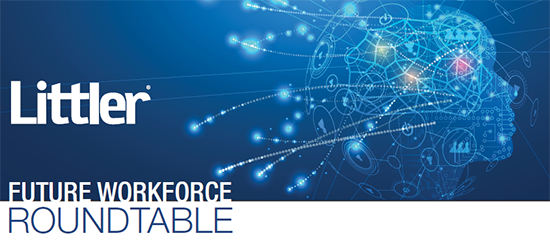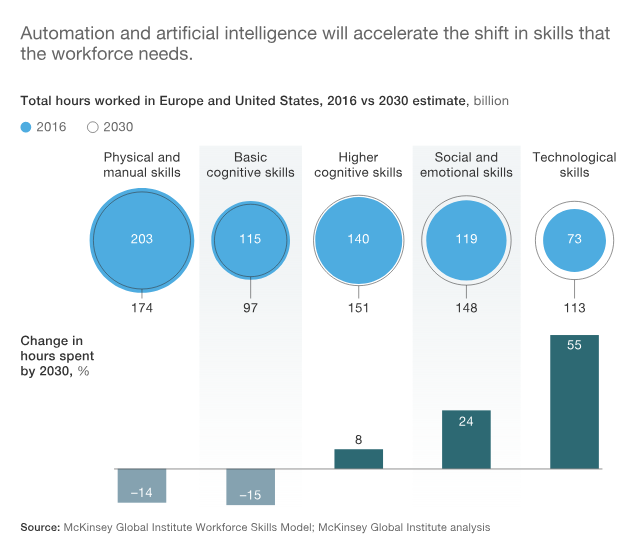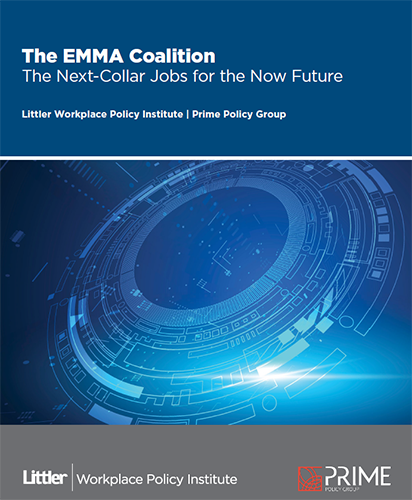
Littler Future Workforce Roundtable 2018
Living, Working, Thriving: Life with Robots & AI
Getting ready for “the greatest human talent challenge of the last one hundred years.”
“Preparing today’s workforce with the knowledge and skills required to participate in the workplace of the future
represents the greatest human talent challenge of the last one hundred years.”
— Michael Lotito, co-chair of Littler’s Workplace Policy Institute

November 2018
Upgrading people…finally!
A partnership of robots, digital disruption and Artificial Intelligence (AI) has combined to reinvent the nature of work and jobs in the workplace.
Early returns show the transformation to be working well and picking up speed.
Billions of dollars are being spent to push this transformation further and faster, with enhanced productivity and a sharp reduction in labor costs promising to deliver up mind-boggling returns: Billions of investment dollars to beget trillions in revenue streams. Businesses that are slow to transform, according to most forecasts, will not only miss out on the big paydays but may also risk their very existence.
The people part of the workplace equation, long jeopardized with the threat of “technological unemployment” by the millions of jobs, is now experiencing a reprieve of sorts.
See related: The End of the Great Robot Scare
In fact, there’s actually a global glut of job openings immediately available…but only for those trained and qualified. Trained and qualified workers are at a premium. With a record 6.7 million job openings in the U.S. alone, Mark Zandi, chief economist at Moody’s Analytics, warns that “Business’ number one problem is finding qualified workers. At the current pace of job growth, if sustained, this problem is set to get much worse. These labor shortages will only intensify across all industries and company sizes.”
A study from Georgetown University’s Center on Education and the Workforce found that a majority of those jobs will require some sort of education and training after high school, but without major changes to the nation’s postsecondary education system—which includes community colleges, four-year institutions and technical and career schools—there will not be enough workers to fill those positions, the report concludes.
And we’re also learning that to be trained and qualified is not a one and done proposition; keeping up is now a lifelong process. Workplace skills, according to a Deloitte study, are turning over every 2.5 years. Therefore, career and job sustainability depend on always-on learning.
“Over the next ten to 15 years,” forecasts McKinsey, “the adoption of automation and AI technologies will transform the workplace as people increasingly interact with ever-smarter machines.” Just maybe, 2.5 years will contract even more.

However, although lots of plans are forthcoming to upgrade robots and AI to be ever smarter, not much, if anything, is forthcoming to upgrade the people needed to perform those millions of jobs in waiting.
There’s a gap between workplace and worker that will expand over time…a very short time.
Bridging the gap
So, how to bridge the gap between what people need to do and know in order to score one of these new-age jobs that are themselves transforming every 2.5 years or less?
Enter, the Emma Coalition, a non-profit, bi-partisan group that explains itself with the tag line: The Next-Collar Jobs for the Now Future.
The EMMA Coalition was conceived by and is a product of two closely aligned organizations: Littler, a San Francisco-based law firm, through its Workplace Policy Institute, and Robotics, AI & Automation Practice Group, together with Washington, DC-based consultancy, Prime Policy Group.
Inspiration for EMMA’s formation and direction springs from the Littler Washington Roundtable (November of 2017), in which forty global experts took on technological disruption and the transformation of jobs, workplaces…and people (See: Workplace Transformation and the Reinvention of Work).
The results of that strategic 2017 Roundtable crystalized to form the basis of The EMMA Coalition and its next steps for the upcoming 2018 Roundtable which will meet in San Francisco in November.
Here’s how the EMMA Coalition explains its mission: “For years, organizations have been talking about, studying, and making predictions about the effects of automation on the global labor market. But for all the ink that has been spilled discussing the impact of the TIDE (technology-induced displacement of employees), there is no organization that is specifically devoted to helping employers and their workers prepare for the TIDE. The Emma Coalition will fill that glaring need.”
The essence of that mission was explained in a recent interview by Michael Lotito, co-founder of the EMMA Coalition as well as co-chair of Littler’s Workplace Policy Institute: “Preparing today’s workforce with the knowledge and skills required to participate in the workplace of the future represents the greatest human talent challenge of the last one hundred years.”
In a world short on specifics and shorter on action about closing the skills gap, the November Littler Workplace Roundtable will also become a forum where the EMMA Coalition can formally detail it’s next steps:
- [O]rganize a nationwide effort and partnership amongst small, medium, and large American businesses and the organizations which represent them.
- Establish a coalition of highly diverse and disparate organizations who understand the challenges of automation and embrace the vision and mission.
- Establish pilot programs at the state/local level to identify best practices for retraining displaced workers.
- Outreach to local businesses to help identify and fill areas of short- to medium-term labor demand.
- Form relationships with partners at state/local level in government, community colleges, and technical schools to establish curricula.
- Create an information junction that highlights the best ideas from the public and private sectors and stimulates information dissemination and engagement.
Fresh air
The EMMA Coalition is decidedly fresh air for a world grown bone weary of chasing AI demons around their workplaces and from the daily stress of workers fearing for the fragility of their careers because of technological disruption. The EMMA Coalition is stepping up right into the face of it all…and just in the nick of time.
The world is looking for action heroes ready and willing to contend with and make sense out of the roiling clash of automation, people and jobs.
As such, one cannot help but root for the success of the venture that the EMMA Coalition has cut out for itself. Short of reversing climate change or curing cancer, it’s the biggest of jobs.
See related: Littler Washington Roundtable 2017:
Workplace Transformation and the Reinvention of Work
See related: What Will Robots Know?
After we endow robots with human-like senses, what will they know about their human workmates…and how will that knowledge be used?




